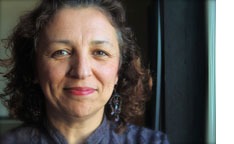Welcome to the September 2010 issue of the Global Washington newsletter. If you would like to contact us directly, please email us.
IN THIS ISSUE
- Note from our Executive Director
- Featured Organization: All As One
- Changemaker: Marty J. Kooistra – Building a Better Global Future
- Spotlight: Community Based Education in Afghanistan
- Book Review – Up and Out of Poverty: The Social Marketing Solution
- Announcements
- Global Washington Events
- Other Events
Note from our Executive Director
Greetings,
Thanks to all of you for your involvement and participation in our summer programs. We were thrilled to have close to 500 of you present for the event with Raj Shah on August 13th. If you missed the event, you can still watch the entire program or read a event recap on our website.
Global Washington is growing. Our diverse and growing membership now represents more than 120 member organizations. Members include some of the world’s most respected companies, NGOs academic institutions, businesses and foundations. By drawing together this community with its unrivalled knowledge networks and hands on experience, Global Washington is raising the profile of Washington State as a vibrant center and respected voice for global development.
Our first annual conference held last December brought together 350 members of the national and local development community. Building on last year’s success, Global Washington will host its 2nd Annual Conference, Bridges to Breakthroughs: How partnerships and innovation are changing the world, on November15th and 16th.
The conference will convene top policymakers and thought leaders to explore how our region can best harness our resources to tackle some of today’s most challenging issues. We will be joined by some of the nation’s senior officials and experts to pursue the following key objectives:
• Explore leading trends and opportunities in global development
• Share best practices in public/private partnerships, social entrepreneurship and resource development
• Explore areas of cooperation and synergy between organizations and across operational sectors
• Build a shared strategy for Washington as a center for global development leadership for 2011 and beyond
We are working to create many opportunities for you all to connect at our conference and to share the work of your organization. You are all doing valuable work in the field, and Global Washington aims to provide a space for you to exchange ideas, share best practices, and troubleshoot challenges with other individuals and organizations in the sector doing similar work.
Hope to see you at the conference.
In unity,
Bookda Gheisar, Executive Director
Featured Organization: All As One
On January 18, 2002, the civil war that shattered Sierra Leone for roughly a decade officially came to an end. But the end to such a brutal conflict was not the end of Sierra Leone’s struggle.
With its infrastructure reeling from the war, and its economy struggling to reincorporate the hundreds of thousands of refugees that fled during the conflict, Sierra Leone was faced with a daunting task of reconstructing the nation. However, in its plan for reconstruction, the government overlooked the weakest and most vulnerable of humans: children.
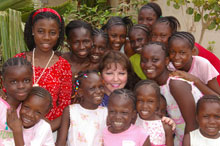 With very limited access to healthcare and nutrition, one in every four children born in Sierra Leone dies of preventable causes before reaching the age of five. One in eight pregnancies result in the death of the mother, leaving the child infinitely more vulnerable to the harsh realities of life in an impoverished community. As of 2007, UNICEF estimates that 350,000 children in Sierra Leone live as orphans, after having lost one or both parents.
With very limited access to healthcare and nutrition, one in every four children born in Sierra Leone dies of preventable causes before reaching the age of five. One in eight pregnancies result in the death of the mother, leaving the child infinitely more vulnerable to the harsh realities of life in an impoverished community. As of 2007, UNICEF estimates that 350,000 children in Sierra Leone live as orphans, after having lost one or both parents.
Such statistics illustrate the dire situation children face in Sierra Leone on a daily basis. As such, it is hard to imagine a future where these children live without fear of going unfed, unsheltered, or un-nurtured. Thankfully, All as One has stepped in to ensure a future of education, good health, and gainful employment.
Founded in 1997, All As One was initially created to serve the needs of orphans of AIDS victims in Zimbabwe, and later the Gambia. It was in the Gambia that Deanna Wallace, founder and Executive Director of All As One, met refugees from the Sierra Leone civil war whose depiction of the situation led Ms. Wallace to visit Sierra Leone. That first visit in 2000 quickly evolved into a much longer stay, ultimately resulting in a shift in focus from Zimbabwe and the Gambia, to concentrate on the children of Sierra Leone.
All as One primarily concentrates on meeting the needs of the orphaned and abandoned children of Sierra Leone. To create an environment that will facilitate the positive growth and development of the children under its care, All As One engages in three mutually reinforcing strategies.
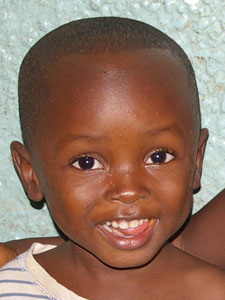 To provide shelter, stability, and nutrition to orphaned and abandoned children, All As One operates an orphanage called the All As One Children’s Center. Currently 50-70 orphans are cared for at the Freetown-based compound. While at the Children’s Center, children are provided food, clothing, shelter, and loving, personal care.
To provide shelter, stability, and nutrition to orphaned and abandoned children, All As One operates an orphanage called the All As One Children’s Center. Currently 50-70 orphans are cared for at the Freetown-based compound. While at the Children’s Center, children are provided food, clothing, shelter, and loving, personal care.
All As One also runs a school for both orphans living at the Children’s Center, and children living in the surrounding area. Instructing children in pre-school through eighth grade, the school’s curriculum includes traditional subjects such as Math, Social Studies, Science, and Literature. In addition to this traditional curriculum, children under All As One’s care have had access to lessons in music, computers, and art.
All As One’s third strategy to facilitate a future for the children of Sierra Leone is healthcare. At All As One’s health clinic, children from the Children’s Center, local staff, and members of the local community have access to medical treatment. Professional health-care providers staff the clinic and the registered nurses on duty 24 hours a day ensure the children have readily accessible health care any hour of the day.
Upon leaving the care of All As One, the children embark on a path of their own choosing. Some leave for higher education, some leave for formal vocational training, and some for jobs. But just as in any loving family, support for the children does not end when they leave All As One’s care. All As One works tirelessly to ensure the children are equipped with the best tools possible so that they can be self-sufficient, contributing members of society.
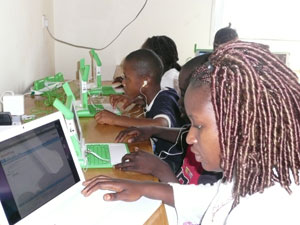 In the future, All as One plans to construct a compound in which all components of All as One’s mission are housed. Plans for the compound include a medical center with a much larger capacity to better serve the children and families of the surrounding community, a larger school with plans to include secondary education in the curriculum, an expanded Children’s Center, as well as a dining hall and playground. The idea is construct this compound as a model for replication across Sierra Leone.
In the future, All as One plans to construct a compound in which all components of All as One’s mission are housed. Plans for the compound include a medical center with a much larger capacity to better serve the children and families of the surrounding community, a larger school with plans to include secondary education in the curriculum, an expanded Children’s Center, as well as a dining hall and playground. The idea is construct this compound as a model for replication across Sierra Leone.
But in order to build such an important project, All As One needs funding. Currently, All as One primarily relies on the charitable donations from individuals all over the world, with some assistance from businesses and NGOs. All As One offers many ways to become involved and contribute to their work including donations, child sponsorship, volunteer opportunities, and the use of websites such as iGive.com and GoodSearch.com. But perhaps the most essential way to contribute to the growth and development of the children of Sierra Leone is through corporate or organization sponsorship of shipping certain necessities such as baby bottles, children’s clothing, household items, educational equipment, and other items on the All As One wish list.
Ultimately, anyone and everyone can have an impact and make a lasting contribution to the well-being of children in Sierra Leone. Thanks to the passionate, dedicated work of organizations like All As One and their donors, the children of Sierra Leone, once destined to a short life of malnutrition and suffering on an unimaginable scale, now have a future.
For the full wish list and a complete listing of ways one can support the activities of All As One, visit their website at www.allasone.org.
Changemaker: Marty J. Kooistra – Building a Better Global Future
Marty Kooistra, CEO of Habitat for Humanity Seattle/South King County, has contributed to housing and human settlement throughout his career. While running a diversified construction business, Kooistra returned to college as a non-traditional student planning to study architectural engineering. The professor in his first sociology course, however, altered that forever by illuminating the connections between housing and all aspects of livelihood. Kooistra’s bachelor’s degree in social work allowed him to merge his passion for the built environment with his deep-seated commitment to social justice and poverty alleviation. This, in turn, led him directly to the affordable housing sector and a career of more than 20 years with Habitat for Humanity, including serving as senior director of global program design and implementation for the organization’s international headquarters.
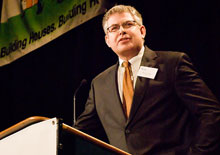 When asked to define his personal mission in life, Kooistra described an ongoing commitment to service. In everyone’s life, he noted, there are points of discovery of both personal vulnerabilities and personal strengths. This kind of outlook, he said, has driven his lifelong sense of responsibility to share his assets and gifts and to be “awake and alert” for ways to learn from those of others. To the extent that this shared perspective exists, Kooistra says, challenges can be recognized and solutions formulated in ways that contribute to community and global transformation.
When asked to define his personal mission in life, Kooistra described an ongoing commitment to service. In everyone’s life, he noted, there are points of discovery of both personal vulnerabilities and personal strengths. This kind of outlook, he said, has driven his lifelong sense of responsibility to share his assets and gifts and to be “awake and alert” for ways to learn from those of others. To the extent that this shared perspective exists, Kooistra says, challenges can be recognized and solutions formulated in ways that contribute to community and global transformation.
The extent of the relationship between Habitat for Humanity and global development surprised me; the organization actually serves more people outside the U.S. than within. Being in Washington, one of the most diverse states, our lives are often tightly knitted with things happening in other parts of the world. Kooistra affirmed that global work has been core to the mission of both Habitat for Humanity International (the organizational headquarters, which actually started in Africa in the mid- 1970s) and to its Seattle/South King County affiliate. Habitat’s direct service provision focuses on creating truly affordable and sustainable housing and on preventing homelessness worldwide. But their mission also has an explicit mandate to serve as a partner and catalyst for global development in ways that go far beyond home construction and financing.
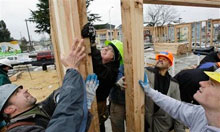 Kooistra said, “When there are disasters such as those in Chile, Haiti, and China, we tend to see people unify around the notion that vulnerability requires us to think about global responses. So, it’s important for us as an organization to be a global partner and to encourage the public to become sustained global citizens. One of the strengths of Habitat is its capacity to garner public participation. We think that our greatest responsibility is helping people move not just from curious individual to casual volunteer, but to committed advocates for a robust housing continuum and revitalized sustainable communities around the world. And truly, the original model for Habitat was the result of the founders seeking an engaging way for people to broaden their understanding and think more deeply about being global citizens.” In addition to their local programs, Kooistra pointed out that 10 percent of the funds raised by all of Habitat’s U.S. affiliates go to support programs outside the U.S.; in this way, the Seattle/South King County affiliate supports the work of Habitat national programs in Kenya, Mexico, the Philippines and Tajikistan.
Kooistra said, “When there are disasters such as those in Chile, Haiti, and China, we tend to see people unify around the notion that vulnerability requires us to think about global responses. So, it’s important for us as an organization to be a global partner and to encourage the public to become sustained global citizens. One of the strengths of Habitat is its capacity to garner public participation. We think that our greatest responsibility is helping people move not just from curious individual to casual volunteer, but to committed advocates for a robust housing continuum and revitalized sustainable communities around the world. And truly, the original model for Habitat was the result of the founders seeking an engaging way for people to broaden their understanding and think more deeply about being global citizens.” In addition to their local programs, Kooistra pointed out that 10 percent of the funds raised by all of Habitat’s U.S. affiliates go to support programs outside the U.S.; in this way, the Seattle/South King County affiliate supports the work of Habitat national programs in Kenya, Mexico, the Philippines and Tajikistan.
The Philippines
Let us look at a couple of examples of Habitat’s work in these target countries. This year alone, Habitat has helped 5,329 families in the Philippines. They note that “due to urbanization, 30 percent of the poor currently live in urban areas, but, by 2025, more than half of the urban dwellers will be poor. The government estimates that between 2005 and 2010, the country needs some 3.8 million new homes.” Through its urban renewal program, HFH Philippines builds efficient and affordable medium-rise condominium-type structures in areas where land is scarce and expensive. In addition, Habitat developed a comprehensive Housing Resource Center, a large and multifaceted volunteer program, and a “Peace Builds” program in the Philippines.
Kenya
The many challenges Kenyans face – 60 percent of people living in poverty, ethnic violence, rising urbanization, and periodic drought and flooding – include very poor living conditions. Inadequate, overcrowded homes, typically with only one room and no windows –breeding grounds for many life-threatening diseases—are commonplace. Since 1982, Habitat for Humanity has built over 2900 homes in partnership with families and over 70 local communities. Habitat’s appropriate technologies strategies tailor construction to local conditions. Houses in Kenya utilize concrete foundations and floors, corrugated galvanized iron roofs and durable walls made of locally-produced brick, stone, rammed earth or stabilized soil block. This kind of simple, durable construction also supports family health.
Habitat’s community-based programs recognize that housing and shelter solutions are sustainable only when considered as part of holistic poverty alleviation efforts. Their projects are accomplished in full partnership with families, local government entities and local and international NGOs. Kooistra is a strong believer in leveraging partnerships and alliances to obtain the efficiency and holistic outcomes that support sustained success. He speaks from experience: while he was in India preparing land for a large-scale project, Hurricane Katrina hit. He was asked to serve as Vice President of Collaborations and Strategic Partnerships and in that role, convened two powerful Gulf recovery coalitions involving Enterprise Community Partners, Enterprise Corporation of the Delta, HFHI, LISC, NeighborWorks, RALLY, Tulane University, and World Vision. The gulf response actually served as a kind of controlled test environment for Habitat’s new global strategic focus on advocacy, collaboration and systemic change. Lessons learned from those recovery efforts laid the groundwork for an enterprise focus on serving as catalysts for transforming the systems that limit access to secure housing and livelihood.
Marty Kooistra certainly has dedicated his life to building for a better global future.
Spotlight: Community based education in Afghanistan
Did you have a chance to read the article in the New York Times about the impact of education and schools in Afghanistan?
Global Washington Member organization, Ayni Education International, will be presenting at the Global Washington conference about their work. Here is a bit more about their approach:
Week after week, headlines are filled with stories of terrorism and extremism. Al Qaeda operatives brutally murder 10 foreign aid workers in Afghanistan, including an eye doctor and dentist; an suicide bomber blows himself up at the gates of the presidential palace in Mogadishu; a road-side bomb kills another U.S. soldier. What’s the best way to reduce threats of terrorism? More soldiers? More security cameras? Full body scans? As in past years, we’ll pour millions of dollars into new gadgets and military build-up. But, threats will continue largely undiminished, because we continue to put our monies and energies far downstream from the source of the problem, which is rooted in poverty, hopelessness, and growing economic disparity.
We actually know what works to reduce these problems. Educating and empowering girls, in particular, may well be the highest rate of return in the developing world. Having now built or repaired 40 schools for approximately 25,000 kids in Afghanistan over the past 8.5 years, I can verify that it is a building block to eliminating poverty, oppression and extremism. Come learn more about the importance of investing in women and girls, as well as effective strategies and solutions, at Global Washington’s annual conference in November.
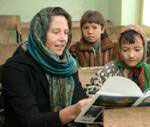 When Julia Bolz and her American colleagues first started working in north-central Afghanistan in January 2002, Afghanistan led the world in child and maternal mortality, homelessness, and landmine victims. Life expectancy was 43 years of age. And, in north-central Afghanistan, the literacy rate was 6.5%. Responding to the call “Build us schools!” from communities visited, government and religious leaders, Julia began work. To date, Ayni staff and supporters have equipped and built or repaired some 40 schools, serving some 25,000 students. Additional projects focus on teacher training, community development, and strengthening the Afghan education system.
When Julia Bolz and her American colleagues first started working in north-central Afghanistan in January 2002, Afghanistan led the world in child and maternal mortality, homelessness, and landmine victims. Life expectancy was 43 years of age. And, in north-central Afghanistan, the literacy rate was 6.5%. Responding to the call “Build us schools!” from communities visited, government and religious leaders, Julia began work. To date, Ayni staff and supporters have equipped and built or repaired some 40 schools, serving some 25,000 students. Additional projects focus on teacher training, community development, and strengthening the Afghan education system.
Before joining the grassroots movement for gender equality, Julia worked at one of Seattle’s most prestigious law firms, Ryan, Swanson & Cleveland as a successful business immigration lawyer, representing Fortune 500 companies worldwide. . She received Seattle’s Tom C. Wales Citizenship Award for her combined humanitarian efforts. Bolz graduated from Smith College.
Book Review
Half The Sky: Turning Oppression into Opportunity for Women Worldwide
By Nicholas D. Kristof and Sheryl WuDunn
2009 Alfred A Knopf Publisher
“Women hold up half the sky”, Chinese Proverb
Development experts from Kofi Annan to PATH’s Chris Elias have stated that the most important thing we can do to bring about positive change in this world is to empower women. Half the Sky is a call to action to do just that. The authors clearly show that the worldwide struggle for women’s equality is “the paramount moral challenge” of our time. It is a powerful and gripping collection of true stories of the outrageous treatment of women around the world – some so brutal that they are difficult to read. And yet it is also an illustration of women overcoming unfathomable hardships. Half the Sky was written by Pulitzer Prize-winning authors Nicholas Kristof, New York Times columnist, and his wife, distinguished journalist and editor Sheryl WuDunn. Their aim is to “recruit” us all to support women around the world in their struggle for real freedom and gender equality. There are stories of the harsh reality of sex trafficking and slavery in Asia and Eastern Europe, honor killings in India, and female genital mutilation. They also talk about rape being used as a weapon in many conflicts such as the current fighting in the “world capital of rape … eastern Congo”.
In the opening pages of this call to conscience, the authors talk about 60 to 100 million “missing” women and assert more girls and women die from preventable causes in any given decade “than all the genocides of the 20th century.” They tell of Prudence Lemokouno, from Cameroon. Her sad story is repeated countless times in rural villages around the world. She received no prenatal care and after three days of difficult labor, a well-meaning birth attendant jumped up and down on her belly, rupturing her uterus. Prudence’s family paid a man to take her 75 miles to the nearest hospital, where the doctor demanded more money. An operation was finally performed, but several days too late, neither the mother nor baby survived.
Half the Sky tackles real life atrocities by giving poignant portraits of survivors, imparting factual information and showing the capacity of ordinary citizens, including Americans, to bring about change. They tell the story of an Ethiopian girl suffering from fistula who was able to have corrective surgery at the Addis Ababa Fistula Hospital. Having finally been cured of this debilitating condition, she stayed on at the hospital making beds and assisting the surgeons. Eventually, she learned to perform fistula operations herself. Though she is still learning to read and write, she now teaches others to perform this surgery.
Kristof and WuDunn note the analogy between women’s status today and the evolution of the abolitionist movement. They point out the overwhelming struggle to create the profound social change that ended slavery and what is needed today to eradicate the pervasive worldwide mistreatment and degradation of women. One of many shocking facts – female slavery is more pervasive today than it was in the 18th century.
Government programs and large charities – with the exception of CARE, which has recently made the empowerment of girls and women a priority – get little coverage. The authors do highlight a few individual Westerners, whom they describe as “social entrepreneurs”, who are doing extraordinary work. They include Zach Hunter, a twelve year old from Atlanta tackling forced labor and child slavery, Greg Mortenson, author of “Three Cups of Tea”, who is building schools throughout Pakistan and Afghanistan, and Harper McConnell who works with rape victims in a HEAL Africa hospital in eastern Congo.
Kristof and WuDunn demonstrate through these women’s stories that it is possible to “turn oppression into opportunity.” Half the Sky closes with a call to arms. The authors suggest steps that each of us can take to end the brutal treatment of women and provide a roadmap to empower all women.
Announcements
Check out Humanosphere–KPLU-NPR’s New Global Development Blog
Interested in our region’s growing leadership role in global development? Take a look at KPLU-NPR’s new blog Humanosphere. Hosted by long-time Seattle journalist Tom Paulson, Humanosphere aims to be your go-to online site for news, dialogue and maybe even humor about matters of global health and development. Take a look. Follow Tom on Twitter (@tompaulson). The site is still taking shape and he wants your ideas, thoughts and critiques.
Social Innovation and Collaborative Leadership in Global Community: iLeap International Fellows Panel Discussion
Global Issues & Perspectives is a free lecture/discussion series sponsored by the Center for Creative Change to address the question: What do we need to know to become effective global citizens? The series is an enriching opportunity to hear, learn from and be inspired by individuals — many of whom are from other cultures and countries — who are invited to Antioch to share their values and vision.
iLeap: The Center for Critical Service is an international nonprofit organization with an intention to cultivate and inspire a new generation of global citizens. iLeap conducts hands-on, educational and professional training programs in Seattle and innovative international travel programs in partnership with communities in Asia, Africa and Latin America. All of our programs incorporate academic experiential learning, and leadership principles designed to support personal and professional development. Our carefully crafted programs prepare participants with the practical skills, critical thinking, and global community of support necessary to create sustainable social change in the world.
When: September 29th at 7 p.m.
Where: Antioch University Campus, Room 100, 2326 Sixth Avenue
Who: Britt Yamamoto, iLeap executive director, is C3 core faculty.
More info: contact Shelley Dove at 206-268-4908.
To find out more about the Center for Creative Change, visit this page. To see more events in the Global Issues & Perspectives series, visit here.
Share Social Enterprise Growth Stories with the SEEP Network and Beyond Profit
Want to share a story about a sustainable international social enterprise improving income and benefits of many low-income people? Want to tell others about the amazing growth of a social enterprise? The SEEP Network, Beyond Profit and other partners need your stories about growth, scale, and transition to highlight both organizational successes and challenges. The SEEP Network is a U.S. NGO that works with associations and organizations to create opportunity for those at the bottom of the economic pyramid. Intellecap’s Beyond Profit is the leading publication on social enterprise and development innovation in the developing world.
We need stories about:
- Sustainable social enterprises (non-profit, for-profit, and hybrid)
- Enterprises that create jobs, financial sufficiency and benefits to poor communities
- Rapid growth, scaling up (and its process)
- A challenging transition
- From developing countries and the Global South
The SEEP Network will post stories online at www.seepnetwork.org reaching thousands of social development practitioners. Beyond Profit will publish the best three stories reaching more than 10,000 people in over 75 countries. The authors of the top three submissions will present at the Social Enterprise Learning Symposium at The SEEP Network Annual Conference in Washington, D.C., Nov. 1-5, 2010. The winner will receive a travel stipend.
Deadline for submissions is September 24. Email socentstory@intellecap.com.
Click here for a template to write your stories. The best stories will have a narrative shape, and will use photographs, graphics and images to convey the organization’s value. The questions under each section are suggestions for documentation. Please contact us if you have any questions. Thank you for your contribution!
Volunteer Opportunities in Seattle Schools with Bridges to Understanding
Bridges to Understanding is currently recruiting volunteers for our Seattle fall school programs. We have some exciting new projects and participants this fall, and hope that both new and returning volunteers will join us in helping make these projects successful. They’re definitely going to be fun!
Bridges volunteers will work alongside Bridges teachers and staff to apply digital storytelling tools to the classroom curriculum. As a classroom volunteer, you will generally work with a small group of students in a middle or high school classroom from week to week, to help them create digital stories. Activities will include reading and discussing articles relevant to digital story topics, photo shoots and media management, reading and discussing messages on the Bridges website, composing and posting messages to the Bridges website, writing scripts, recording narrations, and editing a multimedia story.
In some cases there may also be all-day field trips and/or special events that we would love to have volunteers be involved with.
These positions are ideal for volunteers who enjoy working with youth ages 12-18, are comfortable with technology, would describe themselves as very patient, and are excited about being part of a dynamic learning environment.
Click here for more information about volunteering, including requirements, orientation sessions, and contact information.
RESULTS Book Club & Panel– Half the Sky: Turning Oppression Into Opportunity for Women Worldwide
SAVE THE DATE & START READING!
When: Thursday, Oct 28, 2010, 6:30-8:30PM
Where: Life Enrichment Bookstore, Columbia
City, 5023 Rainier Avenue South
Seattle, WA 98118-1926 – 206-650-8791
Join RESULTS Seattle for a book club open to the public. There will be a panel discussion on the book and the issues raised by the authors of forced prostitution, trafficking in women, gender violence and maternal mortality and how the most effective way to fight global poverty is to unleash the potential of women. The book features the stories of courageous women and their supporters around the world who have successfully overcome extreme oppression.
The book: Half the Sky: Turning Oppression Into Opportunity for Women Worldwide.
Vintage Books, NY, NY, 2010. By Nicholas D. Kristof and Sheryl WuDunn
The Panel of Speakers on areas covered in the book:
- Anisa Mohamed Ibrahim , a 2nd year medical student at UW and volunteer with the medical student run Al Shifa clinic serving low income people without health insurance, will provide a brief synopsis of the book.
- Dr. Laura Hart, is a RESULTS activist, past President of Washington Physicians for Social Responsibility and a Seattle urologist who travels the globe training and assisting physicians to do surgery on women with fistulas from child birth injuries in developing countries
- LueRachelle Brim-Atkins works with Cultural Reconnection Mission (CRM) based in the NW African-American community. She travels to Africa each year as a member of the Vision & Planning Team of CRM. This group of African American women has several sustainable joint ventures in Kenya, East Africa and in Ethiopia, including libraries, water projects and women’s economic development projects. One project is in Kogelo, ancestral home of President Obama.
- Someireh Amirfaiz is Executive Director of Refugee Women’s Alliance (ReWA), a Seattle nonprofit organization that provides comprehensive services for refugee and immigrant women and their families, including programs to assist refugee and immigrants impacted by domestic violence, human trafficking and sexual assault.
The book is available in paperback. Copies will be available at Life Enrichment Bookstore. For more
information about the book club, contact Ellie Graham at gramgary@earthlink.netor 206-721-0141.
Apply now for the University of Washington Foster School of Business’s 7th Annual Global Social Entrepreneurship Competition
GSEC seeks student-generated innovative social business ideas that target poverty alleviation in developing economies. GSEC provides cross-cultural, transformational practical learning experiences for student participants to hone their business skills, expand their networks, and access new resources.
Each year, GSEC brings the world to the University of Washington: a select group of semi-finalist student teams attend GSEC Week in Seattle where they visit regional companies, present their business ideas to judges, and compete for at least US$30,000 in prizes, including an ICT and two global health prizes.
Watch the 2010 GSEC video for an overview or take a look at the GSEC banquet photo album featuring keynote speaker Bill Gates Sr.
Application deadline November 4, 2010
Contact gsec@uw.edu with questions.
Visit GSEC online for more information.
Development Associate Position Available at Prosthetics Outreach Foundation
Seattle based Prosthetics Outreach Foundation is seeking a talented, highly organized and self-motivated Development Associate to support a broad range of development activities. Responsibilities include supporting special events, grants, individual gifts, and communications and marketing. For a full position description, visit www.pofsea.org. E-mail cover letter with salary expectations, resume and references to hr@pofsea.org by September 30th.
World Affairs Council’s Global Leadership Series Features Dr. Ibrahim Assane Mayake
The World Affairs Council presents Dr. Ibrahim Assane Mayaki as a part of our 2010-2011 Global Leadership Series. Dr. Ibrahim Assane Mayaki of the Republic of Niger is the head of NEPAD’s Planning and Coordinating Agency, headquartered in Midrand, South Africa. He worked as a Professor of Public Administration in Niger and Venezuela from 1976 to 1987 before joining the Uranium industry in Niger as a Senior Executive. During 1996 and 1997 he was successively appointed Minister in charge of African Integration and Cooperation and Minister of Foreign Affairs. In November 1997, he was appointed Prime Minister, a function he held until January 2000. In August 2000, he set up the Analysis Centre for Public Policy. From 2000 to 2004 he was a guest Professor at the University of Paris XI, where he lectured on International Relations and Organizations; he also led research at the Research Center on Europe and the Contemporary World within that University. In 2004 he was appointed as the Executive Director of the Rural Hub, a multilateral think-tank based in Dakar, Senegal, from where he was recruited as Chief Executive Officer of NEPAD. Dr Mayaki is the author of the book, “La caravane passe…” focused on his political career.
Thursday, October 7, 2010, 6:30pm
Africa Connected Series
Global Leadership Series:
Leadership and Development in Africa with Dr. Ibrahim Assane Mayaki
For more information and registration, please visit http://www.world-affairs.org/event_gls_mayaki.htm
Bridges to Understanding Receives Top Recognition for K-12 Education Program
We would like to congratulate Bridges to Understanding! Their citizen diplomacy program, The Bridges Collaborative: Supporting 21st Century Education Worldwide, was selected as a Top Program by the K-12 Task Force of the U.S. Center for citizen Diplomacy (USCCD). The program is a joint project with the CREATE Lab, a division of Carnegie Mellon University’s Robotics Institute. It uses cutting-edge digital and robotic technology to connect teachers and students in middle and high classrooms in Seattle, Peru, Guatemala, India, South Africa and other countries around the world. As a Top Program, The Bridges Collaborative will be highlighted as a key component of the upcoming U.S. Summit for Global Citizen Diplomacy, to be held November 16-19, 2010 in Washington, DC.
“We are honored to be selected for this recognition on the eve of our tenth anniversary of connecting youth around the world to explore how they can be active, responsible global citizens,” said Joyce McClure, Executive Director of Seattle-based Bridges to Understanding. “The vision of our founder, Mercer Island resident and renowned humanitarian photographer Phil Borges, of a harmonious, interconnected world in which youth are actively engaged as global citizens, has inspired Bridges to become what it is today.”
A complete listing of the selected Top Program organizations, and detailed information about the U.S. Summit for Global Citizen Diplomacy may be found at: www.usc4cd.org/summit. For more information about Bridges to Understanding, please visit www.bridges2understanding.org.
Veterans for Smart Power–Petition for Diplomacy and Humanitarian Development
Next week, the US Global Leadership Coalition will have a big opportunity to move their agenda forward at our annual conference by introducing their Veterans for Smart Power program.
Veterans from across the country have been signing a petition over the past few weeks to urge Congress to elevate diplomacy and humanitarian development alongside a strong defense. In just under a month, there are already 8,300 dedicated supporters.
We all know veterans, and it would be a tremendous help if you simply forwarded this to your friends who are veterans or military families and ask them to sign up at www.vetsforsmartpower.org. You can also click here to join us on Facebook and ask your network to stand with veterans and military families.
submit your events to our calendar!
Global Washington Events:
November 15 & 16
Other Events:
September 22
University of Washington School of Social Work’s 3rd Annual Practicum Kickoff
September 25
Bridges to Understanding presents: “Bring the Power of Digital Storytelling into Your Classroom”
Bo M Karlsson Foundation’s Third Annual ‘Mahilaa Night’
September 29
October 5 – November 30 (Tuesdays)
UW Lecture Series – Food: Eating Your Environment
October 7
World Affairs Council: Leadership and Development in Africa with Dr. Ibrahim Assane Mayaki
October 14
Mercy Corps: Redefining Emergency Response
October 28
